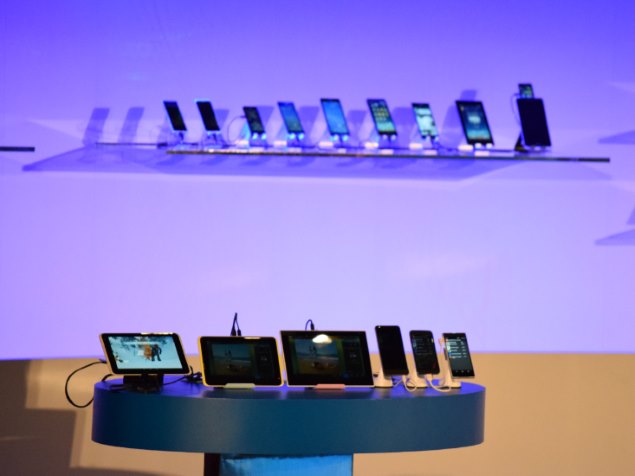- Home
- Tablets
- Tablets News
- Intel Now Shipping 14nm Cherry Trail Processors to Tablet Manufacturers
Intel Now Shipping 14nm Cherry Trail Processors to Tablet Manufacturers
By NDTV Correspondent | Updated: 6 January 2015 15:53 IST

Click Here to Add Gadgets360 As A Trusted Source

Advertisement
Along with launching 28 new processors for mainstream notebooks and hybrid devices, Intel today announced that it has begun shipping its next-generation tablet processors, based on the architecture codenamed Cherry Trail, to manufacturers. This means that products with Cherry Trail processors will begin appearing in markets in large quantities by the middle of 2015.
Cherry Trail succeeds the current Bay Trail architecture and will share the 14nm manufacturing process first used for Intel's Broadwell processors which launched under the new Core M brand late last year, and the mainstream Core i7, i5, i3, Pentium and Celeron brands earlier today. While Broadwell-based Core M processors will be found in premium ultra-portable fanless notebooks and 2-in-1 hybrid tablets, Cherry Trail is aimed at more traditional tablets including low-cost models.
While specific details such as variants, model numbers and speeds have not been announced, Intel stated that the new processors will support 64-bit instructions and will offer improved graphics capabilities. Specific performance information has not been released yet either, although device battery life will almost certainly receive a boost thanks to the power-efficient 14nm process. Cherry Trail processors will also work with Intel's new LTE-Advanced modem hardware, including support for Cat-6 speeds and carrier aggregation.
Intel is also promoting additional technology related to 3D depth sensing and real-time gesture interpretation, and context-aware devices which could potentially integrate themselves into users' natural daily rhythms and habits. Cherry Trail tablets should support applications that help users dispense with passwords in favour of biometric ID methods, and supplant most wired connections with wireless ones such as Intel's own Wi-Di display output standard.
Intel has struggled for many years to catch up to its competitors in the mobile processor market, primarily Qualcomm and other vendors of competing ARM-based processors. The Bay Trail architecture has helped Intel carve out a presence for itself in the tablet space even as it still struggles to gain traction in smartphones.
Cherry Trail succeeds the current Bay Trail architecture and will share the 14nm manufacturing process first used for Intel's Broadwell processors which launched under the new Core M brand late last year, and the mainstream Core i7, i5, i3, Pentium and Celeron brands earlier today. While Broadwell-based Core M processors will be found in premium ultra-portable fanless notebooks and 2-in-1 hybrid tablets, Cherry Trail is aimed at more traditional tablets including low-cost models.
While specific details such as variants, model numbers and speeds have not been announced, Intel stated that the new processors will support 64-bit instructions and will offer improved graphics capabilities. Specific performance information has not been released yet either, although device battery life will almost certainly receive a boost thanks to the power-efficient 14nm process. Cherry Trail processors will also work with Intel's new LTE-Advanced modem hardware, including support for Cat-6 speeds and carrier aggregation.
Intel is also promoting additional technology related to 3D depth sensing and real-time gesture interpretation, and context-aware devices which could potentially integrate themselves into users' natural daily rhythms and habits. Cherry Trail tablets should support applications that help users dispense with passwords in favour of biometric ID methods, and supplant most wired connections with wireless ones such as Intel's own Wi-Di display output standard.
Intel has struggled for many years to catch up to its competitors in the mobile processor market, primarily Qualcomm and other vendors of competing ARM-based processors. The Bay Trail architecture has helped Intel carve out a presence for itself in the tablet space even as it still struggles to gain traction in smartphones.
Comments
Catch the latest from the Consumer Electronics Show on Gadgets 360, at our CES 2026 hub.
Further reading:
14nm, Bay Trail, Cherry Trail, Intel, Intel Bay Trail, Intel Cherry Trail, tablets, CES, CES 2015
Related Stories
Popular on Gadgets
- Samsung Galaxy Unpacked 2025
- ChatGPT
- Redmi Note 14 Pro+
- iPhone 16
- Apple Vision Pro
- Oneplus 12
- OnePlus Nord CE 3 Lite 5G
- iPhone 13
- Xiaomi 14 Pro
- Oppo Find N3
- Tecno Spark Go (2023)
- Realme V30
- Best Phones Under 25000
- Samsung Galaxy S24 Series
- Cryptocurrency
- iQoo 12
- Samsung Galaxy S24 Ultra
- Giottus
- Samsung Galaxy Z Flip 5
- Apple 'Scary Fast'
- Housefull 5
- GoPro Hero 12 Black Review
- Invincible Season 2
- JioGlass
- HD Ready TV
- Laptop Under 50000
- Smartwatch Under 10000
- Latest Mobile Phones
- Compare Phones
Latest Gadgets
- Red Magic 11 Air
- Honor Magic 8 RSR Porsche Design
- Honor Magic 8 Pro Air
- Infinix Note Edge
- Lava Blaze Duo 3
- Tecno Spark Go 3
- iQOO Z11 Turbo
- OPPO A6c
- Lenovo Yoga Slim 7x (2025)
- Lenovo Yoga Slim 7a
- Lenovo Idea Tab Plus
- Realme Pad 3
- Moto Watch
- Garmin Quatix 8 Pro
- Haier H5E Series
- Acerpure Nitro Z Series 100-inch QLED TV
- Asus ROG Ally
- Nintendo Switch Lite
- Haier 1.6 Ton 5 Star Inverter Split AC (HSU19G-MZAID5BN-INV)
- Haier 1.6 Ton 5 Star Inverter Split AC (HSU19G-MZAIM5BN-INV)
© Copyright Red Pixels Ventures Limited 2026. All rights reserved.







![[Sponsored] Haier C90 OLED TV | Dolby Vision IQ, 144Hz OLED and Google TV in Action](https://www.gadgets360.com/static/mobile/images/spacer.png)









